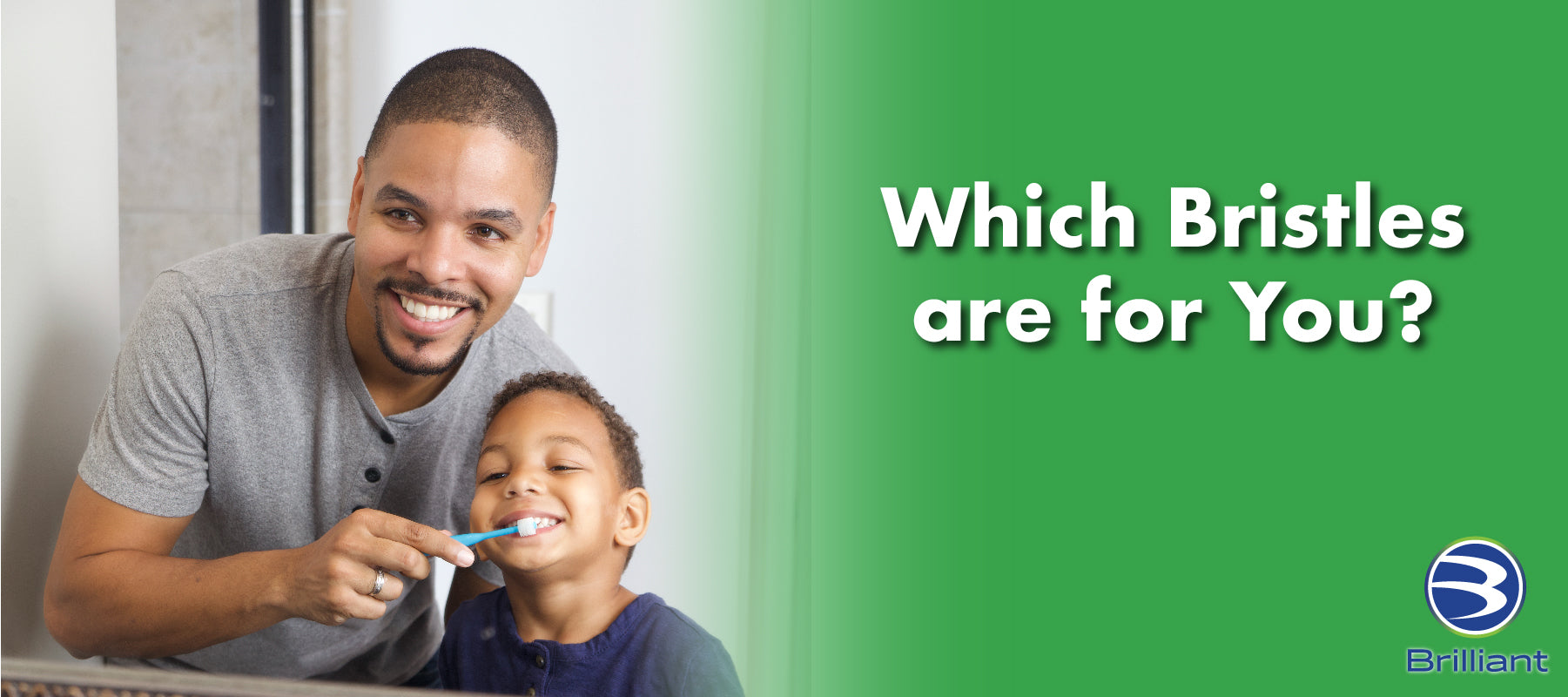- Phone: 1.404.373.4030
- Opening Hours: Mon-Fri 9AM-5PM Eastern

DISCLOSURE: Noelle Copeland RDH is the oral care specialist and dental consultant to the Brilliant and Baby Buddy oral care lines through Compac Industries. See terms below.
Sometimes it’s not easy to know which toothbrush to choose!
If you have sensitive teeth, you may need a soft toothbrush for sensitive teeth or an extra soft toothbrush for sensitive teeth, oftentimes these are also called specialty toothbrushes!
So which one do you choose or even look for while standing in the toothbrush aisle???
Let’s start out by discussing what the difference is between the choices you have when it comes to the toothbrush bristles that are available to you.
What does the name mean?
Aside from using special names like extra, ultra, special, supple, or therapeutic, most of the toothbrush bristles you have access to will be measured in fineness by millimeters and then ranked as soft, extra soft, sensitive soft, or something else along those lines.
Most manufacturers don’t list the bristle millimeters measurements on the package for you. This is where sub names have become helpful to explain choices for consumer understanding. Although each manufacturer is different, most will be true to the descriptive name listed.
What should you choose?
Choose an extra soft instead of a soft toothbrush if…
Soft bristled toothbrushes are the best choice for healthy, everyday toothbrushing. A soft toothbrush has just the right amount of firmness to remove plaque and bacteria but is still soft enough to help control excessive toothbrush wear or abrasion. It is still a possibility for someone to brush too hard with a soft toothbrush and this cando damage to the teeth and gums, However it’s much less compared to the damage that can be done using a medium or hard bristled toothbrush.
A soft toothbrush is like the Goldilocks of toothbrushes….. it’s just the right size, with the right amount of softness for the job of cleaning teeth, effectively.
This is because a toothbrush should be firm enough to remove plaque, bacteria, and food debris but soft enough to not damage teeth and gums when being used.
The winner… The soft toothbrush.
The extra soft toothbrush has finer bristles, and sometimes even more bristles, which can be in the hundreds to thousands. Those finer bristles are gentler on teeth and gums while being used.
This is a brush design that is a good choice for those who have oral sensitivities like sensitive teeth, and sensitive gums, where regular brushing has become more painful or less effective due to sensitivity.
If a soft toothbrush is too painful to use, where it prevents regular and effective brushing, then the next choice would be an extra soft toothbrush.
Extra soft toothbrushes work great, and are the best choice for many people that deal with sensitive teeth or gums. If you do not have sensitive teeth or gums then the only other reason you may need to choose an extra soft toothbrush would be if you are a scrubber and you are trying to break the habit of scrubbing too hard, while saving your teeth and gums in the process.
If you have to go from using a medium or hard bristled toothbrush to a soft or even an extra soft toothbrush you’re going to feel like you are not getting your teeth as clean. But don’t let that fool you. Those brushes will clean your teeth just as well, dental research has shown there is no difference in plaque indices when patients were using a soft toothbrush versus a medium toothbrush. So do your teeth and gums a favor and choose soft or extra soft.
Medium and hard bristled toothbrushes should not be used on the teeth that are actually inside of your mouth.
That sounds funny doesn’t it!
Well… it sounds funny because it’s true and most people don’t know this truth, because they think ” a toothbrush is just a toothbrush, right? “.
Which makes you wonder why it’s even a choice to begin with, all mixed in with the other regular toothbrushes in the oral care aisle! Honestly, I have no idea why it’s still an option, but what I do know is why you should never use them in your mouth.
When to use a medium or hard bristled toothbrush
Medium and hard bristled toothbrushes should only be used on “fake teeth” and “removable appliances, outside of the mouth not while they are still in your mouth. This includes:
If you have no idea what any of the above items are, then you’re in luck, you do not need a medium or hard bristle toothbrush for anything. Move along to the Soft toothbrush selection and go from there.
Brush all of your teeth, even the removable ones!
If you do have any of those items and you are not already brushing them on a regular basis, just like you brush the teeth inside your mouth, then you need to go ahead and start that now.
Just soaking or rinsing an oral appliance is not enough hygiene care to remove the plaque and bacteria that can also build up on a removable appliance.
As for the argument of using a medium or hard bristled toothbrush inside the mouth because of the misinterpretation that it removes more plaque, and “cleans better”…… well it’s just not true and has been proven not to be true through dental studies.
What has been proven is that they significantly cause more abrasion and wear on the teeth leading to recession, and tooth abrasion that can become very painful and sensitive over time.
So the overall winner here in the battle against the bristles is the soft toothbrush, followed up by any specifically designated softer toothbrush, for whatever reasons that are special or extenuating for effective and regular oral care.
© 2020 Compac Industries. All rights reserved.
This article is intended to provide an understanding of and knowledge about “oral health topics” as expressed through the perspective and experience of the author. It is not intended to be a substitute for professional advice or counsel, including the diagnosis or treatment of any condition. Always seek the advice of your dentist or other qualified healthcare provider with any questions you may have regarding a medical condition, an oral condition, illness or treatment of any listed or non listed situation above. By using this site, you signify your assent to our Terms and Conditions. If you do not agree to all of these Terms and Conditions, do not use this site.
Noelle Copeland RDH is an Oral Care Specialist and Dental Consultant who provides content for Brilliant Oral Care and Baby Buddy.


DISCLOSURE: Noelle Copeland RDH is an Oral Care Specialist and Dental Consultant who provides content

DISCLOSURE: Noelle Copeland RDH is an Oral Care Specialist and Dental Consultant who provides content

We believe that all people are fearfully and wonderfully made and designed in the womb for a grand purpose.
Useful Links
Copyright © 2023 Compac Industries | All Rights Reserved.